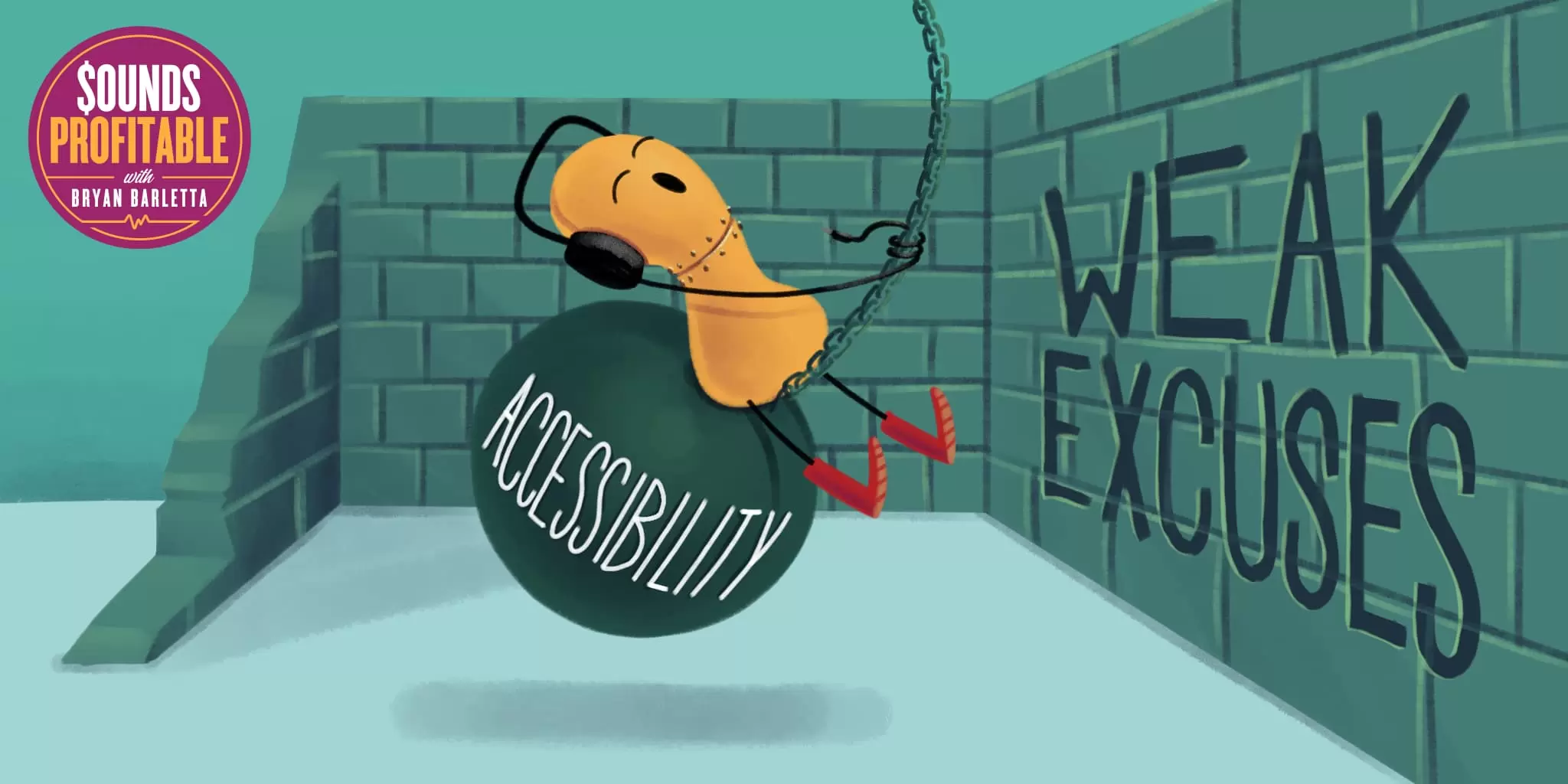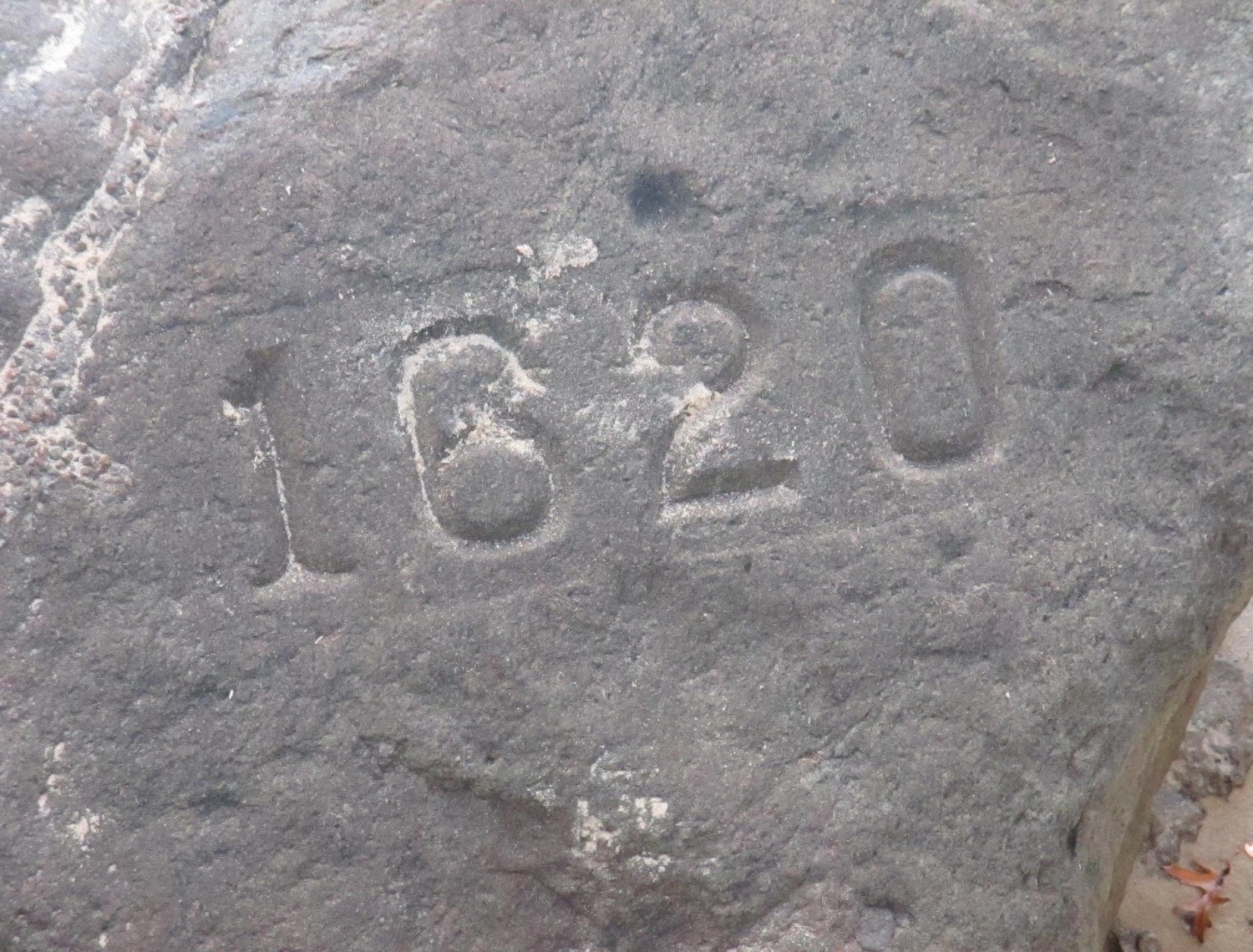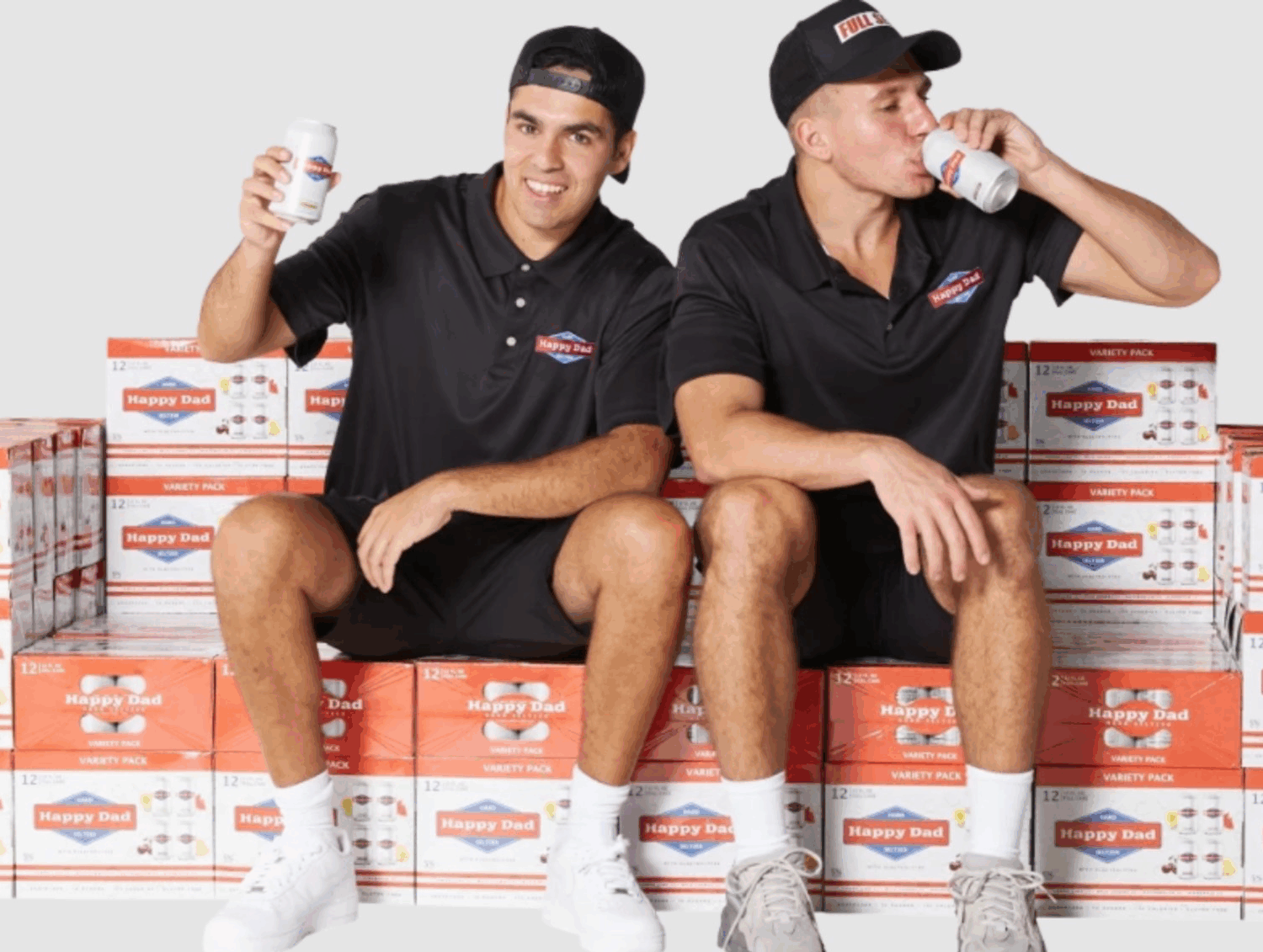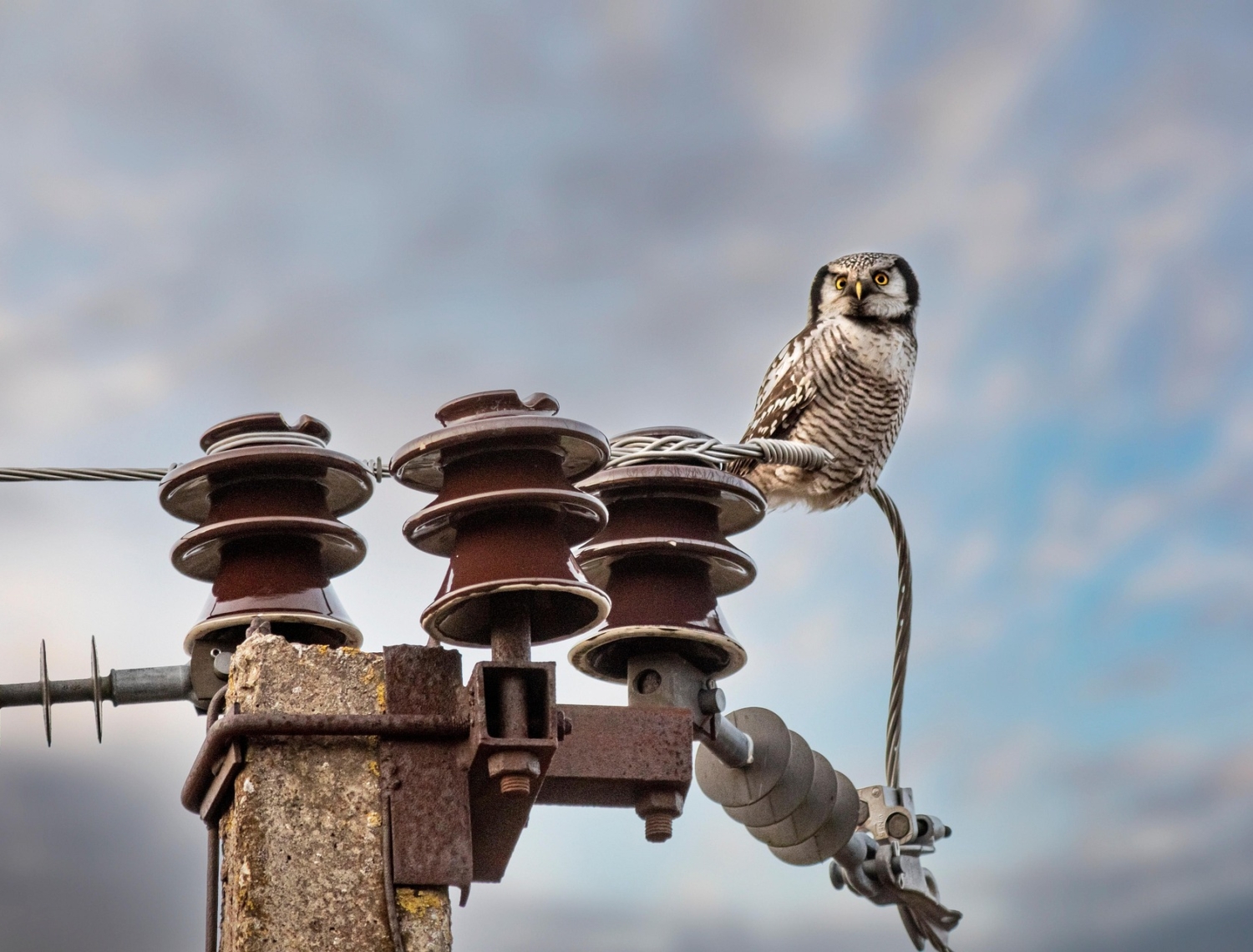Nick Hilton, Director and Co-Founder at Podot joins me to dig deeper into why I think Spotify is Not Going to Kill Podcasting. You can find it completely free on my Premium Feed, along with a narrated version of today’s article posted on Wednesday.
I’m very excited to share this week’s guest article with you by Caroline Mincks. It’s so easy to dismiss adding transcripts to a podcast, especially with a massive lack of uniformity between podcast players. And while I hope the podcasting space normalizes having transcripts out of the goodness of its heart, every podcast that isn’t currently using them is absolutely missing out on an audience hungry for content.
Introduction
Podcasting is an audio medium. It exists in the realm of the aural, it relies on the sense of sound, it is noises put in order. This is hardly new information, but it bears repeating because what I am about to say may seem a bit unusual considering this fact:
Deaf and hard of hearing people want access to podcasts.
We want to be able to have the same opportunities as hearing people, to learn and grow, to be entertained, to be inspired. It’s not necessarily that the podcasting world shuts the door on us – more often than not, they just don’t even think to crack it open in the first place.
Recently, and unfortunately not the first or last time, I was reminded of this situation. A podcast-focused event invited me to speak about deaf representation within the medium, drawing on my experiences both as a deaf person and as someone who has created a show about deafness. But the event that specifically asked me to speak about this very issue had no structure to make their event accessible for the deaf, nor were they willing to make it a priority. Ultimately, I chose to withdraw and release the talk publicly, on my podcast, with accessibility fully in mind.
Bryan Barletta of Sounds Profitable saw my thread on Twitter and reached out to me, asking me to – in his words – beat him up about where his podcast and website fell short in terms of deaf accessibility. Considering everything I had just gone through with the event, to say I leapt at the opportunity to do exactly that is an understatement.
So using Sounds Profitable as a proxy for all podcasts, we’re going to find the holes and fill them, making his podcast first and foremost more accessible, but also ultimately increase his show’s ability to reach an even wider audience.
The Assessment
In my initial judgment, I noted three key areas that were lacking:
- Show notes/website that provided no links to transcripts
- No alternative ways to consume the podcast (such as a captioned video)
- A lack of alt text/image descriptions to accommodate screen readers.
While these are all things that are possible to address, they will require time, effort, and – in all likelihood – money.
Considering that, the question becomes…why bother? Why on earth should an already busy podcaster expend their resources to accommodate disabled people for a medium that is, by definition, already less accessible to them by virtue of its format? After all, Sounds Profitable seems to be doing just fine as is. What’s the point in doing all that extra work just to reach what is surely a sliver of the population?
Well, apart from inclusion and diversity being things podcasters should all aim to improve on and it being the right and kind thing to do, to put it bluntly: because they would benefit.
I ran an informal poll on my Twitter where I posed the question “Have you ever given up on/not bothered with a podcast because it was in some way inaccessible to you?” I have a following of about 2,000, and because I frequently speak about disability and accessibility, a lot of those people follow me for that reason, chances were high anyone responding to the poll would already have these issues in mind and be directly affected by them.
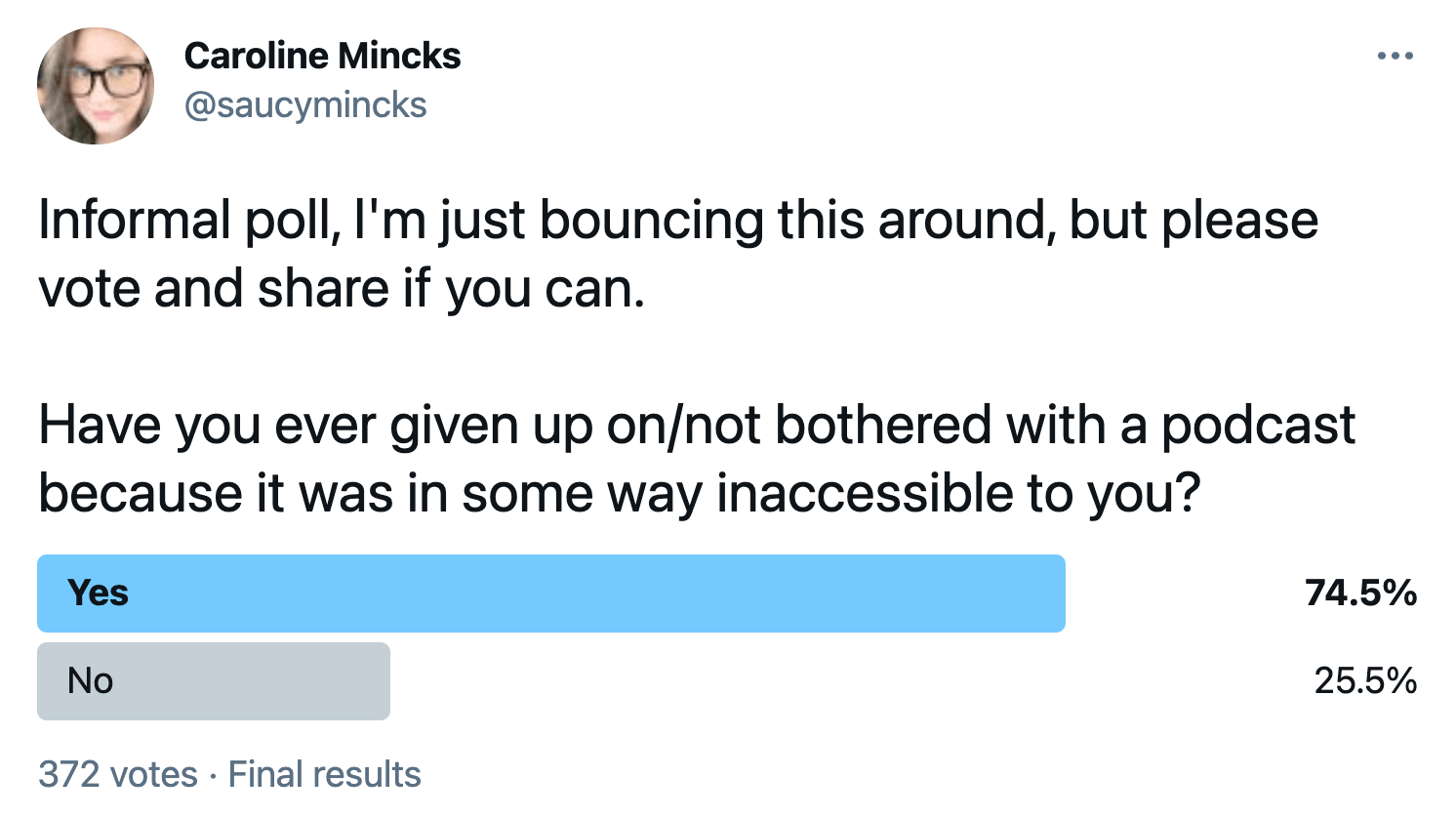
Even though I expected that, the numbers were still staggering: out of 372 responses to the poll, 74.5% said that yes, they had avoided a show because of a lack of accommodations. That is 277 people – an overwhelming majority. 277 potential audience members. 277 people who could consume, rate, and review your podcast. 277 people who could share it with friends, family, and colleagues and grow your base (and, by extension, your earnings) exponentially.
Apply that to Sounds Profitable and think of how much further that reach could go. How many people have found his podcast, thought it might be an interesting and informative listen, and then turned away from it because something about the show made it too challenging for them to be an audience member?
Now that we have identified the what and the why of podcast accessibility, the next step is the how. How do you take an audio medium and make it available to deaf people?
Start With Transcription
The first thing to do is arguably also the biggest, and that is to provide transcripts.
Easily found, clearly formatted, detailed, complete, and free transcripts. Putting your transcripts behind a paywall is unacceptable, as is requiring people to go through the steps of finding your contact information, requesting transcripts, and having to wait for you to provide them. Having your transcripts available in several locations (show notes, website, and Twitter account are your best bets) on the day of episode release should always be your goal.
One vital thing to keep in mind: automated transcripts are not a complete solution, but a starting point. Using software such as Otter, Descript, or other solutions that are provided by your hosting platform is a great way to get the ball rolling and do the bulk of the work. But ultimately automated transcripts fall short. They cannot achieve full accuracy, they can’t always correctly identify the speaker, they lack information about things like sound effects, and they are usually terribly formatted. While work is always being done to improve these programs, they still need a manual touch. Providing half-measured solutions can, unfortunately, look just as bad as not providing transcripts at all, alienating the deaf community.
With 12 episodes of Sounds Profitable published, I gave Bryan the following suggestions:
- Make sure that all future episodes have proper transcription.
- Work through the back catalog in tandem
- Communicate the timeline to the audience, so they know what to expect
Communication is key here, and probably the most important thing for all podcasters to take into account as they update their accessibility.
Planning For Success
Plan for transcripts as early as possible. Creating a new show? Work transcription into your schedule from day one. Already have a show and want to retroactively provide transcripts? Be realistic about how long it will take you to make each one and figure out how best to set a consistent rollout. As a general rule, plan on 2–3x the length of the file to correct a transcript. So if you have a 20-minute episode, plan on at least 40 minutes to an hour to correct the automated transcription.
An important thing to know while creating your transcripts is that they are not closed captions. Captions appear in real-time along with the audio in video format, and a transcript is exactly what it sounds like – a script in document form, which can be read independently of the audio. With that distinction in mind, let’s talk about best practices for transcripts.
First, consistency in format is key. There is no industry standard for podcast transcripts.
Whether any given episode is a poem or a conversation matters less than making your transcripts consistent from one episode to the next. In addition to format, clarity of tone is vital for comprehension. The aim is to provide a transcript that would allow someone who was only reading it a comparable experience to someone listening to the show – indicating things like emotional shifts, music, sound effects, ambient noise, laughter, sarcasm, and crosstalk will accomplish this. Make sure that these things are noted with the timestamp where they occur, and for things like music and sound effects, it is a good practice to describe them. “Upbeat electric guitar with heavy percussion which fades out as the host begins to speak” is a much better description than simply “Music”, and something like “The heavy thud of a book falling onto the rug” is far clearer than “Thud”.
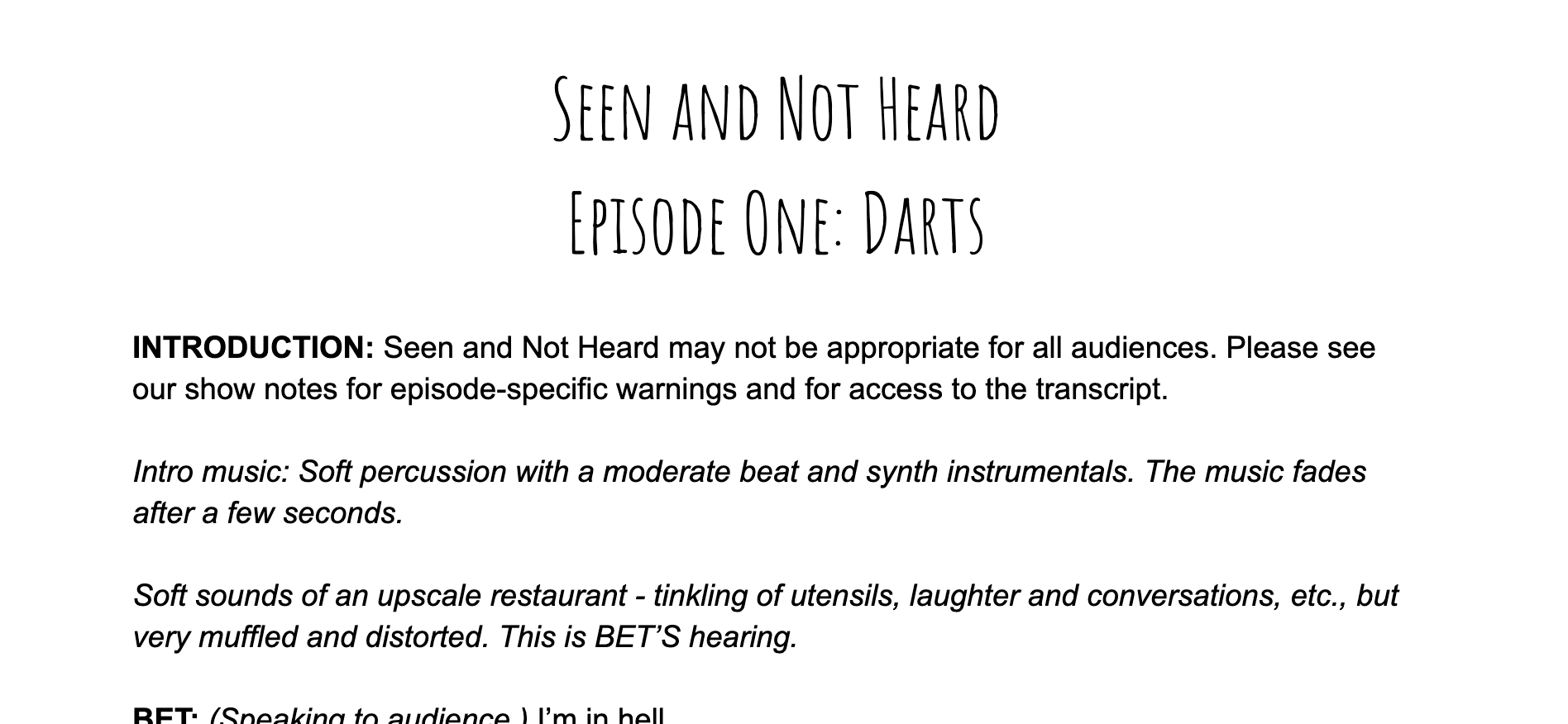
Another reason why clear, properly formatted transcripts are important is because they also accommodate people who may need to use a combination of reading and listening to experience a podcast. Think of how using subtitles while watching a movie can be helpful – when they include tone indicators, a sarcastic line is prevented from being read seriously, for example. Transcripts are useful not only for deaf and hard of hearing people, but neurodivergent and low-vision people as well for this exact reason. They allow people the opportunity to check and keep up. Although I am primarily focusing on the needs of deaf people in this article, it is vital to keep as many people in mind as possible when considering accessibility.
Another way to let people access your content is by using the transcript of an episode to create a captioned video or audiogram. I am the accessibility consultant for a wonderful audio drama called Temujin that has done just this – they are in the process of uploading videos to YouTube that have the audio of each episode set to a beautiful backdrop where the lines appear in real-time. It allows for an immersive audio experience and lets the audience read along at the same time. This is a fantastic format for people like me, who have enough residual hearing to be able to listen, but who often need to read along in order to fully comprehend.
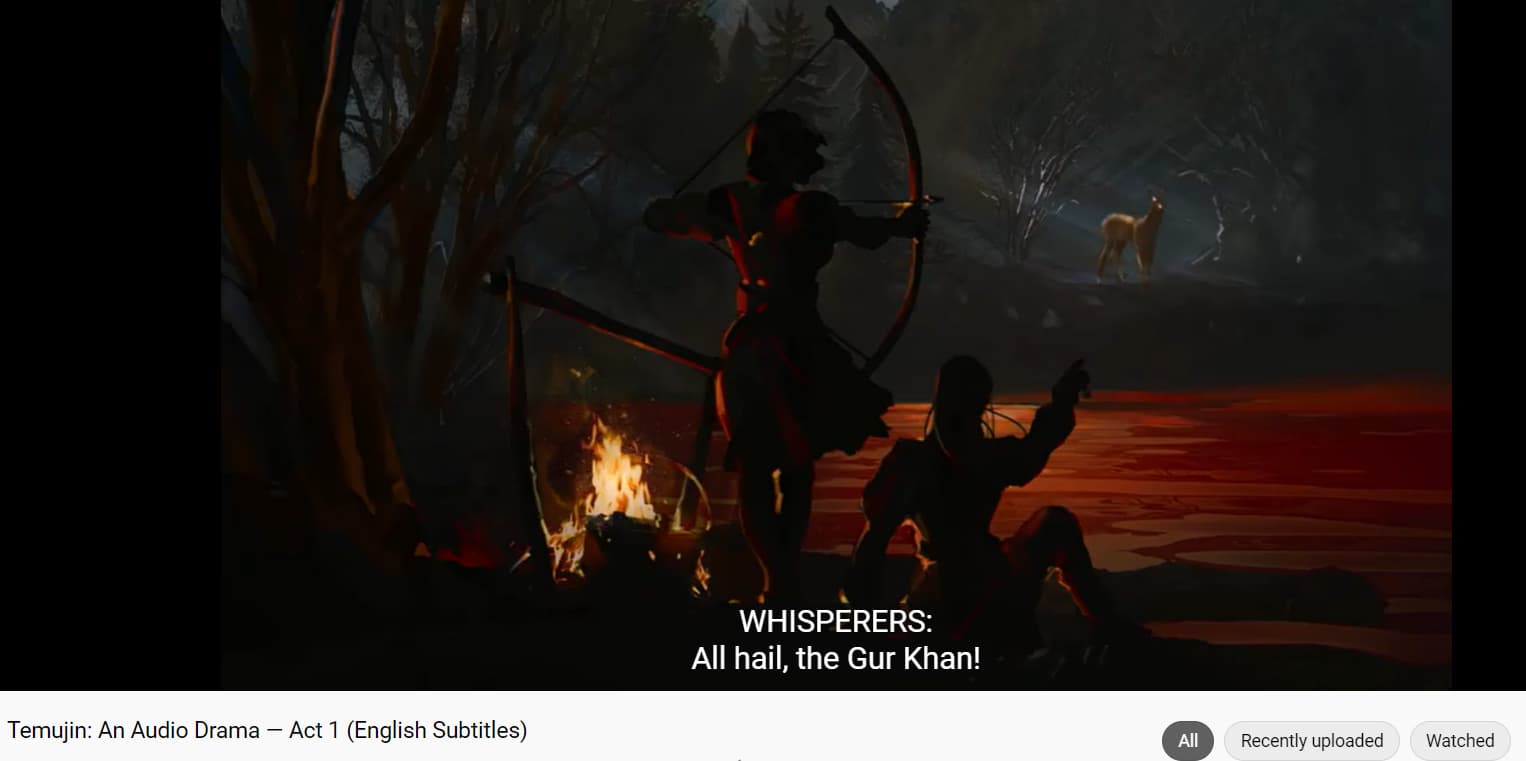
And, finally, in terms of availability of these accommodations: when I perused the Sounds Profitable show notes and website, I saw that there was ample opportunity in both to provide prominent and clear access links once they have their transcripts up and running. These are such an easy thing to provide – by far the easiest part of the entire accessibility process. Make sure they are clear and easy to read on mobile as well, and, ideally, make transcripts available to be downloaded if possible. Another great way to make sure your transcripts are easily found is to provide a shortened URL for your transcript link in the show notes, such as a TinyURL or bitly, that people can easily copy and paste or type into a browser in case the hyperlink should fail for any reason. That’s it – just a simple hyperlink and a typed-out version right there at the top of the show notes. It takes all of a minute, if that, and it makes all the difference in the world to those who need it.
Wrapping It Up
Although Bryan had, essentially, given me carte blanche to roast Sounds Profitable to my heart’s delight about where the show failed in terms of accessibility, I recall being a little worried about how honest I was being and how much at one time. Not that Bryan is not a very nice person who was genuinely interested in this, but I’ve done this enough to know that sometimes, even the most well-intentioned person’s eyes start to glaze over at a certain point.
In an ideal world, I wouldn’t have to work so hard to sell people on the idea of empathy, and simply saying “you should make your podcast accessible because it is the morally better choice than not doing so” would be enough. In an ideal world, I wouldn’t have to go into situations where I’ve been hired to provide some expertise on this subject and still assume that there will be resistance to my advocacy. This isn’t an ideal world, though, and the truth is that for many, the biggest motivator is avoiding loss of revenue and audience members.
Generally speaking, I’m of the opinion that whatever gets you to do the right thing usually works for me, even if it’s a self-centered reason. Even so, I was relieved that Sounds Profitable was enthusiastically committed to making itself accessible because it is the right thing to do, and it was acknowledged that while there were a lot of things to figure out, it really didn’t seem to be that much more work to put better practices in action.
With a bit of effort and consideration, your podcast can easily become accessible to a much wider group of people, which can increase your audience, increase your profits, and – best of all – set an excellent example for how to do the right thing.
Though it may seem like more trouble than it’s worth, especially when access doesn’t pay off instantly for you in terms of things like downloads and shares, it is about a steady increase over time. A few new listeners per episode thanks to your commitment to accessibility can become dozens, then hundreds, and so on and so forth. It is absolutely worth investing the time and work – and realistically, it can more than pay off within a relatively short time.
There is a phrase I often use when I want to encourage people to reflect upon how we can improve, both as a community and individually, and I will leave it with you here as a final thought:
I believe we can all do better. Prove me right.
Homework – with Yappa
I want to switch up how we handle homework with Sounds Profitable. Instead of giving ya’ll things to think about, I want to open it up fully to all of you. Whether related to this article, a past article, or a general question, I want to hear the things that are rattling around in your head about the podcast adtech and advertising space. Sometimes, it’s not easy to ask these questions internally. I want to be that sales engineer resource to all of you or be able to point you in the direction of someone else who can answer that question for you. So click the Yappa image below!
Sounds Profitable News
Sponsorship
Sounds Profitable is entirely sponsorship supported. Everything I do is about education and providing a resource to grow podcasting. That’s why I take such pride in announcing new sponsors that help me continue to build Sounds Profitable as an independent resource for the industry.
- Headgum’s goal is to produce, curate, and promote the best podcast content from around the web
- Podcast Movement, the world’s largest community of podcasters. News, resources, and the best events in podcasting!
- Sound that Brands, when your client wants their own podcast.
I’d also like to thank SpokenLayer for coming back on as a Full Sponsor.
If your company is interested in becoming a sponsor of Sounds Profitable, just hit reply and let me know!
Product Deepdives
Adswizz is back this month for their second deepdive of 2021! We’re recording this week and I’m excited to share even more with you next week. You can find all our previous deepdive here!
Up Next
We’re now at 14 presenting partners (welcome Edit Audio!) and 24 total participating companies for Up Next, launching next Monday, May 10th, completely free to everyone. It would mean the world to me if you share next week’s article and introduce more friends and colleagues to Sounds Profitable this week!
Market Insights – with ThoughtLeaders
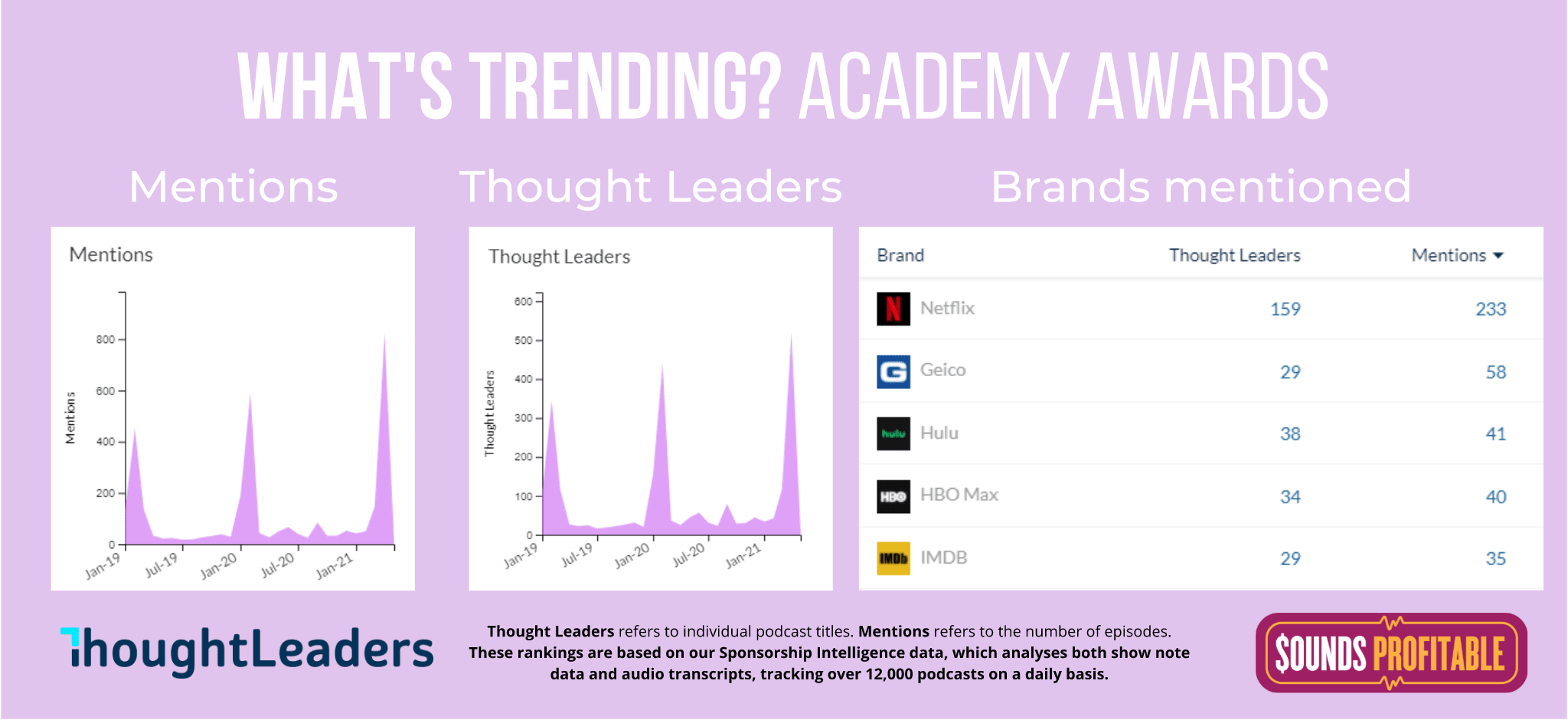
I’m really digging the new updates from ThoughtLeaders. It’s interesting to see the brands associated with topics like the Academy Awards. Outside of Geico, all of those streaming services and IMDB all provide unique content around specific award shows, which makes sense for podcasters to reference when their listeners can find the content. Quite the lead Netflix has. If you’ve got any thoughts to share, click the Yappa image above!

